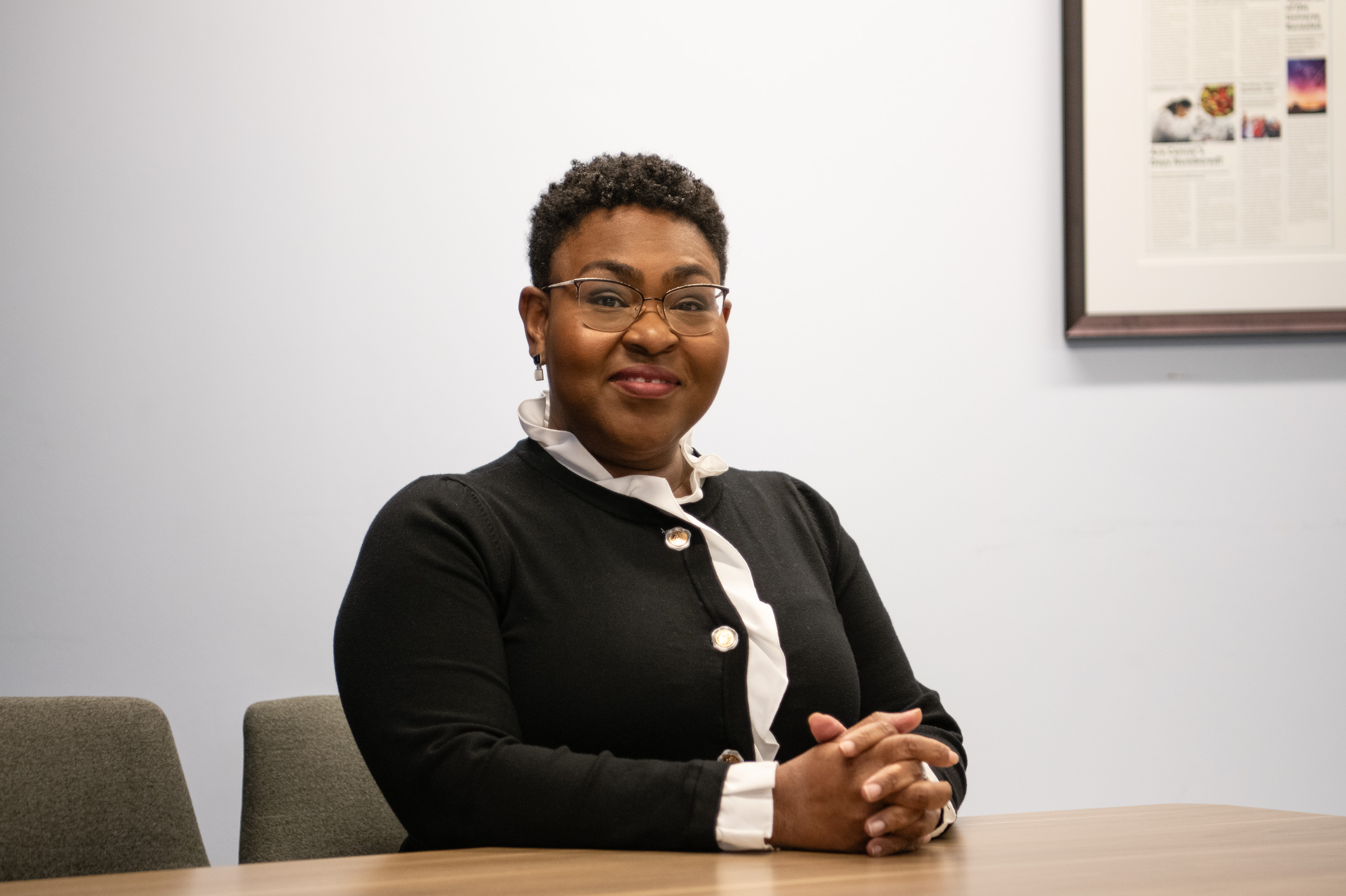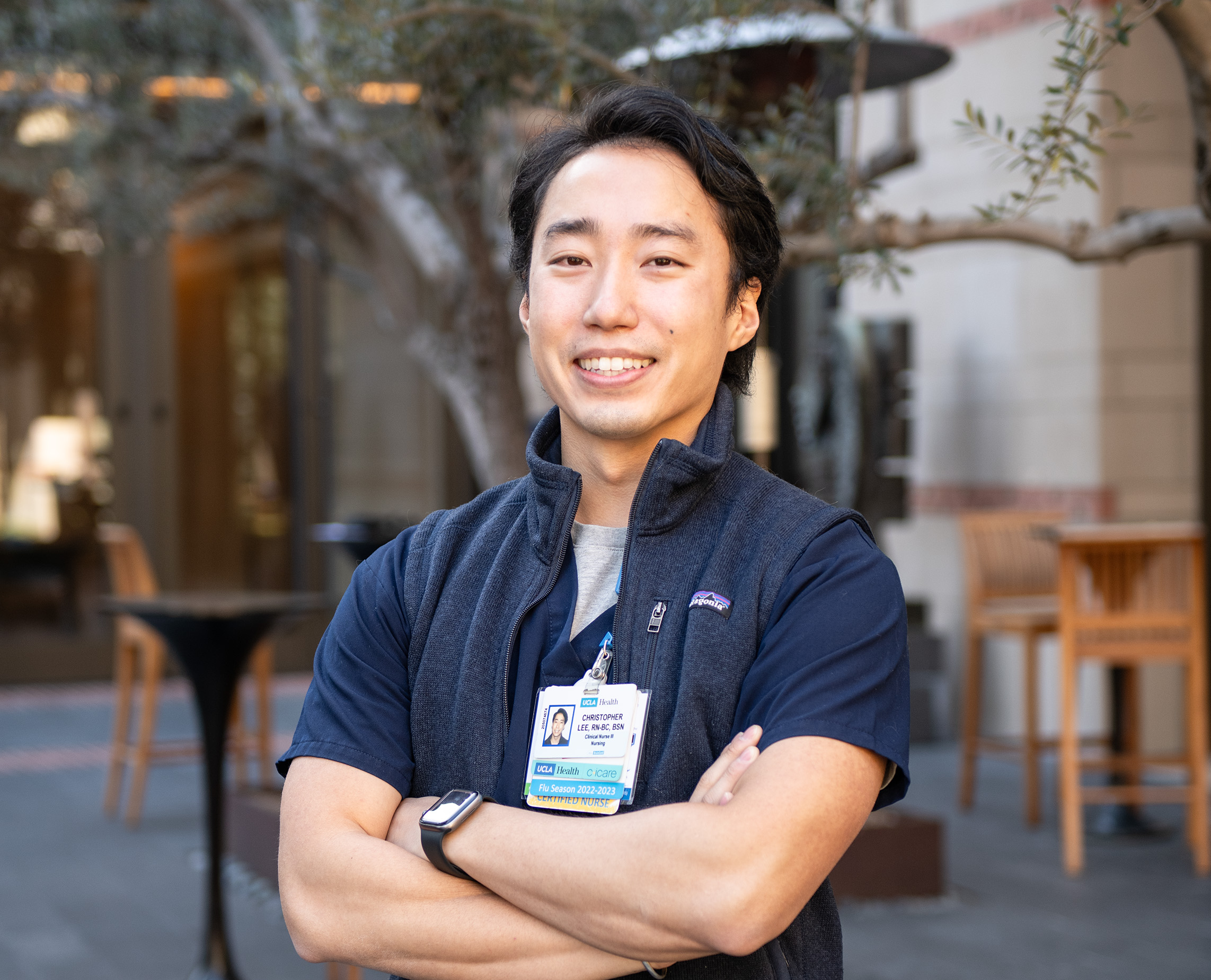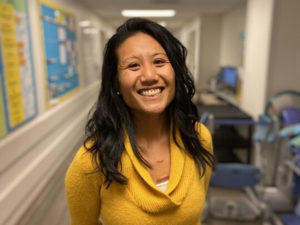Amy Castillo is pictured. The clinical nurse manager has been at UCLA since 2001 and works in the 6 West unit of Ronald Reagan UCLA Medical Center, which specializes in post-vascular, orthopedic and plastic surgical care. (Andrew Diaz/Daily Bruin)
By Anna Dai-Liu
February 9, 2025 at 11:34 p.m.
Beep, click, slam.
Then-newly hired nurse Kemi Reeves sat alone in her car, processing her first day of work. That day, she saw nurses managing very sick patients – patients who at smaller hospitals would be in intensive care units but were placed into her intermediate care unit at UCLA, she said.
Earlier that day, Reeves watched in awe as her preceptor – an experienced nurse mentor – transferred patients to the ICU. And then, she said, she began to cry.
“I called my then-boyfriend – now husband – and I was like, ‘I don’t think I can do this,’” Reeves said. “I had made it to the big leagues. These nurses were skilled. They were masterfully prepared to provide care for extremely sick patients. And what I realized is: I needed to level up.”

Nearly two decades later, Reeves serves as associate director for the UCLA Alzheimer’s and Dementia Care Program. She is one of around 5,100 registered nurses whose jobs beyond the bedside at UCLA Health range from informatics to nurse leadership.
But their roles are not easy. Whether through being involved in leadership councils or teaching, nurses said they advocate for how to improve their care.
“Where people like to pigeonhole, the voice of the nurse is in the patient advocate,” Reeves said. “(But) nurses are innovators, right? We will solve problems. And so when you start to think about the more expansive needs of a health care center, your natural-born innovator should be invited in.”
For some nurses, the journey begins in childhood. Medical-surgical nurse Christopher Lee works as a clinical nurse in the 6 West unit of Ronald Reagan UCLA Medical Center, which specializes in post-vascular, orthopedic and plastic surgical care. He promised at age 3 to take care of his grandmother in her old age, and as he watched his clinical pharmacist mother, he began thinking about how he could care for patients in the same way, he said.

After switching from biology to nursing midway through an undergraduate degree in Wisconsin, Lee joined UCLA’s cardiothoracic ICU in 2017. Realizing he wanted to care for patients who were in a more stable state, he transferred to medical-surgical six months later, he added.
Lee recalled that he and another new coworker spoke very formally to each other when they first arrived at 6 West before realizing they were both in a state of “fake it till you make it.”
“You’re like a baby nurse,” Lee said. “You’re really learning how to take care of someone – but then also how to take care of yourself, too, as you enter this very professional role.”
Lee currently works three 12-hour shifts per week and is in charge of three to four patients each shift, he said.
Being able to ensure continuity of care across these shifts is unique to nursing, added Amy Castillo, a clinical nurse manager for 6 West who joined UCLA in 2001.
During the COVID-19 pandemic, one of her patients had Guillain-Barré syndrome – a disease that attacks the nervous system from the periphery and is potentially fatal if it reaches the lungs. Over the course of her Sunday to Tuesday shifts, Castillo said she noticed the patient’s breathing worsen and rushed him to the ICU for intubation, where a tube is inserted into the windpipe to keep the airway open.
Her patient was unable to have family there because of COVID-19 concerns, she said.
“I walked over with him the whole way. I held his hand,” Castillo said. “I made sure that he felt comfortable, even though he wasn’t sure about how it was going to happen afterwards. And I – actually, he doesn’t know this – but I visited him twice in the ICU while he was intubated because it had such an impact on me.”
Reeves said she has also bonded with patients, including celebrating her graduation from nursing school in a patient’s room after joking around with the patient while studying.
She specializes in gerontological, or elderly, care – a field she was drawn to because she felt that older patients’ priorities can often be drowned out in a fast-paced health care setting, she said. After working in her hometown of New Orleans and then in San Diego, Reeves said she now splits her workdays between providing direct care for patients with dementia and improving care methods as UCLA Health’s first director of nursing health care equity.
And nursing as a field continues to evolve. Former medical-surgical nurse Lynn Mayer said she decided to become a nurse informaticist to ensure technology works for nurses.
“Instead of the patients being my patient, it’s like the nurses are my patient or the hospital system is my patient,” said Mayer, who has worked at UCLA since 2006. “Even though I don’t get to touch the patients and be with them, I’m helping the people that do.”

One project of hers was installing a bedside iPad for every UCLA hospital patient to provide entertainment and a method for communication. These iPads allowed a terminally ill patient to watch their favorite movie and a combative, intubated patient to explain their discomfort, she said.
Mayer is also exploring speech-to-text transcription for charting and AI-generated summaries to help nurses put more time into providing care, she said.
But all of these changes, Mayer added, can only happen if nurses have a voice. Multiple nurses recalled times when care was far from easy – Lee’s colleagues experienced burnout during the COVID-19 pandemic, and a patient from Castillo’s unit once punched a nurse in the face while being admitted, threatening other people in the ward.
“If you don’t have a seat at the table, you might find yourself on the menu,” Castillo recalled a conference attendee saying.
UCLA float pool nurses also rallied last May against decreased scheduling flexibility – concerns that went ignored by hospital management, a nurse alleged at a June UC Board of Regents meeting.
[Related: Nurses protest Ronald Reagan UCLA Medical Center’s proposed schedule changes]
Some nurses, therefore, have stepped up to the table themselves.
Castillo previously worked in the neurology department’s education office, organizing rotation schedules and educational opportunities for the department’s students, residents and fellows as “their mom away from their mom,” she said. Her current role as the night manager can include helping nurses through procedures they are unfamiliar with or have not practiced in a long time, she said.
Another issue Castillo has tackled is workplace violence. She said she has worked with her Unit Practice Council on introducing de-escalation training, panic alert buttons and a “gray triangle” door sticker to alert carers of potentially combative patients.
Lee, who chairs the Unit Practice Council and sits on UCLA Health’s Nursing Executive Council, became involved in leadership in 2019. Lee, the grandson of immigrant custodians, developed a program that sponsors UCLA Health staff – including custodians – to become certified nursing assistants via a partnership with Santa Monica College, he said.
Improving diversity also continues to be an issue. Castillo said she entered nursing for her grandmother, who – at a time when women were discouraged from joining the workforce – was told she was too stupid to become a nurse.
Ultimately, nurses said they chose to stay at UCLA because of the representation they have in leadership and decision-making. Mayer said she also appreciated the opportunity to try different paths.
Learning from and exploring that range of possibilities, the nurses added, is something every person interested in nursing should strive for.
“Whenever people think of a nursing degree, yes, there is the face of the nurse in the hospital, and that is valuable,” Reeves said. “(But) what are your interests? Because that may be nursing, right – it just may not be the poster of what a nurse looks like.”

